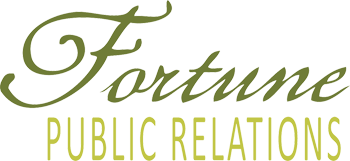Fortune PR is a San Francisco Bay Area-based public relations firm, formed in 1986, specializing in media relations for the restaurant and natural, organic, and specialty food product and beverage industries.
Does your business need a publicist?
An excerpt from the SFPFS Newsletter by Fortune Public Relations' Tom Walton:
If you're thinking of hiring a publicist, you should know what the job entails. The following quote is the best description I've come across of what a publicist does: "It is the task of the publicist to translate the value and image of your business into the context and language that is appealing to the media. The publicist should be aware of topics currently favored by electronic or print outlets in the target geographic areas and should have contacts with key people in the media, especially decision makers who will be persuaded to cover your story." This quote is from Melba Beals, journalist-turned-PR person and author of a book about public relations (see below).
"It is the task of the publicist to translate the value and image of your business into the context and language that is appealing to the media."
If you feel you have a product or service that's noteworthy, perhaps you do need a publicist. You could advertise, of course, but most readers and viewers are more impressed if they learn about you in real news stories.
Why Not Do It Yourself?
Some business people successfully do their own public relations, but most don't have the time or the resources. A good publicist has computer equipment, media lists, contacts and know-how that would probably take you months to develop. Are you a skillful copywriter? Do you enjoy "schmoozing" on the phone? Do you stay on top of the constant personnel and editorial changes at local and national media? Do you like to "toot your own horn?" If you answered no to any of these, you can see where a publicist comes in.
Choosing The Right Publicist
Publicists tend to specialize. If you run a restaurant, retail or catering business, import or manufacture a food product, or have a cookbook in the works, you'll want to find an experienced food-oriented publicist. Your best bet is someone who knows the local and national food writers, who has an obvious enthusiasm and affinity for the industry and a track record of providing good service to clients. The Food Society has numerous members who are public relations professionals specializing in the food and beverage industries. Ask for referrals from colleagues who have had experience with publicists. And once you've interviewed a publicist, check references. Past clients can tell you if the publicist is reliable, organized and businesslike and if he/she listens and responds to needs. Finally, ask if they would hire the publicist again. When interviewing a publicist, ask to see results from previous projects such as print clippings, radio tapes or video clips. Perusing press kits, press releases or event invitations may not tell you whether the publicist's effort paid off, but it will indicate the caliber of the effort.
When interviewing a publicist ask to see results from previous projects such as print clippings, radio tapes or video clips. Also ask the publicist how he/she would approach your business or product. Do the ideas seem creative and realistic? Although you can't expect a publicist to do a detailed plan "on spec" you can ask for a free consultation of an hour or two and a rough draft outlining what might be accomplished over three months.
What's It Worth?
Publicists generally bill their services in one of three ways: (1) retainer; (2) project fee; or (3) hourly rate. If you choose to put your publicist on a monthly retainer (anywhere from $1000 to $5000 a month), you should have an agreed-upon set of tasks or goals. Do you want product samples to go to the top 25 markets and followups with all the food editors in those cities? Do you want pitches made to all the trade magazines along with follow-up phone calls? If your publicist suggests a project fee, be specific in defining the project. Hourly fees range from $35 to $75 a hour. Although this arrangement works for some, a retainer sends a nicer message; the publicist begins to feel like part of the team and part of a long-term effort.
"If you choose to put your publicist on a monthly retainer you should have an agreed-upon set of tasks or goals."
The publicist's bill reflects time spent planning strategies and creating special promotion ideas, getting to know you and your product through interviews and research, writing press kit copy, coordinating printed materials, designing individualized media lists and making phone calls. All these take time, as you know if you've tried to do them yourself.
Are You Getting Your Money's Worth?
Evaluating results can be tricky. After the first month, however, you can at least evaluate your relationship. Personality conflicts that make it difficult to work together can doom a project. Allow at least 6 to 12 weeks for clipping results; most major newspaper food section are planned that far in advance. It may take six months to generate magazine coverage. Be patient. Planting an idea and watching it grow into a story is part of the process.
A good publicist wants results as much as you do, but an ethical publicist also knows that he/she cannot ever guarantee a story placement. Be suspicious of those who make promises or charge per placement. A good publicist provides accurate, interesting information on time and has a sense of what we call "good schmooze." Knowing when to call and not call writers and reporters, knowing their needs, deadlines and interests, and taking the time to be informed about the appropriate publications and people make the difference between adequate and excellent public relations.
A good publicist wants results as much as you do, but an ethical publicist also knows that he/she cannot ever guarantee a story placement.

